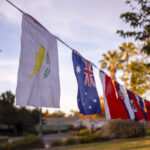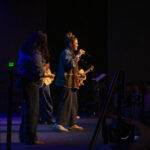
The college experience is one where the student is meant to learn and be challenged. Students are expected to complete their undergraduate studies with a major or concentration that corresponds to the industry they desire to join. Students at California Baptist University must complete the general education requirement the institution puts in place for students to experience well-rounded education.
Some classes, whether outside of an individual’s educational requirement or not, will challenge the student’s worldview and dare them to step out of their comfort zone. Possessing the willingness to step out of one’s own comfort zone is not only a product of maturity but also intelligence.
Marissa Hernandez is a junior sociology major. She had the opportunity to take Introduction to Sociology, which then led to her deciding to switch her major to sociology so she could pursue the study of human behavior and interaction. Hernandez’s experience is common. Students are encouraged to continually question what they want to do after graduation, which enhances one of CBU’s “Core 4” outcomes of education: to be academically prepared.
“I took an intro to sociology class as a pre-nursing student and I am so glad I did,” Hernandez said. “I have always had a passion for helping others, but I was not sure how I wanted to do so. After taking that class, I switched my major and it has been one of the best decisions I’ve ever made.”
Rylie Horn, junior kinesiology major, was able to enroll in classes that were not related to her major. She wanted the opportunity to expand her education and challenge her worldview.
“I have taken a couple of classes throughout my college years that have challenged me and were way different than my major,” Horn said. “These courses were about topics that I had never thought of or talked about. A couple of my favorites were Minorities in America with Dr. Kenya Davis-Hayes and Applied Ethics with Dr. Amy Stumpf.”
Dr. Antonio Mejico, assistant professor of social work, teaches classes that are designed to challenge the student’s perspectives on a variety of social issues. Mejico professes to his students that enduring an education where one’s perspectives and views are shifted and put to the test is healthy.
“I am a big fan of Fred Rogers,” Mejico said. “Rogers said ‘When we talk about our feelings they become manageable.’ I have always thought about that in a way that if we don’t talk about the challenges that we face in the world, they aren’t as manageable. The more that we can talk about important issues that might not always be comfortable is important. When we challenge ourselves to view the world through the lens of others, we begin to see the beauty and diversity that God created.”
There are benefits to implementing different courses into one’s undergraduate career. Hernandez mentioned that since elective units are required for students, this provides an opportunity for students to take classes that pique their curiosity.
“Elective units are required and I think it’s best to choose classes that you find interest in,” Hernandez said. “By going out of your comfort zone, you may find new areas that spark your interests in regards to what type of career path you are seeking.”
Horn also said that different courses spark new interests and that they are beneficial for any student’s education. She also talked about how a variety of classes have played a role in her personal development.
“The benefits for me were finding new things that I became passionate about,” Horn said. “If I never took these classes, I never would’ve become the person that I am today and would’ve stayed stuck in the same place that I was in after graduating high school.”
Mejico always has words to tell his students before they dive into the content of the course. He encourages empathy and dialogue that is healthy and conducive to an individual’s learning experience.
“I tell my students to be still,” Mejico said. “This is because Christ is present in every moment of our lives and is present in every conversation. This reminds us that we do not have to endure difficult conversations alone.
“I also tell my students that our minds work best when they’re open,” Mejico said. “We don’t have to agree all the time, just remain open. My favorite thing about teaching the courses that I do is that I get to witness the transformation taking place. My biggest hope is for my students to leave viewing the world differently as they entered it.”
Both Hernandez and Horn explained that having an open mind will be helpful when considering taking courses outside one’s comfort zone.
“The best advice I could give to other students would be to not hold back,” Hernandez said. “It’s very important to break out of your comfort zone. My mom always told me that being too comfortable in life can hold you back from endless adventures and opportunities. There are so many fun opportunities CBU has to offer and I wouldn’t risk missing out on them.”
“I would say to be open to learning about new things and ideas that may contradict your previous thinking,” Horn said. “I would also advise to actually do the reading because most of the time you’ll get a lot out of it.”
Mejico said he is proud whenever any student of his enrolls in a class that may be outside their comfort bubble because taking classes to talk about topics a student is unfamiliar with takes courage and encourages what Mejico calls a “transformative education.”
“The fact you took the step to enroll in the class is very important. It takes courage to step out of what is familiar to you. Learning about what is outside your comfort zone is actively participating in transformative education,” Mejico said. “This is where a student leaves a class thinking, feeling and seeing the world differently.”


